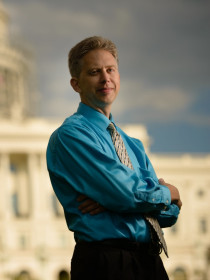
Craig Volden
Professor of Public Policy and Politics, University of Virginia-Main Campus
Chapter Member: Virginia SSN
Areas of Expertise:
Connect with Craig
About Craig
Volden studies legislative politics and the interaction among political institutions, including within American federalism. His current projects include studies of innovation and policy diffusion across states and localities, and an analysis of the legislative effectiveness of individual members of Congress. He is Co-director of the Center for Effective Lawmaking.
Contributions
Who are the Most Effective Lawmakers in Congress?
Key Findings Brief,
In the News
Opinion: "Workhorses, Not Show Horses: Five Ways To Promote Effective Lawmaking in Congress," Craig Volden (with ), Politics + Society, The Conversation, August 29, 2022.
Opinion: "How the Record Number of Female Lawmakers Will — and Won’t — Change Congress," Craig Volden (with ), The Washington Post, January 23, 2019.
Opinion: "Senators Used to Excel at Lawmaking. Now, Not So Much. Here’s What Needs to Change.," Craig Volden (with ), The Washington Post, June 30, 2017.
Research discussed by , in "These Strategies Can Help Policymakers Break through Partisan Gridlock," UVA Today, February 16, 2017.
Opinion: "Does Bipartisanship Even Work in Today’s Polarized Congress? Yes.," Craig Volden (with ), The Washington Post, January 3, 2017.
Quoted by Matthew Yglesias in "A Hillary Clinton Presidency Will Greatly Boost Women's Representation in Politics, with Big Policy Consequences," Vox, June 6, 2016.
Guest on Virginia Public Radio, February 1, 2016.
Opinion: "These are the 10 Most Effective Lawmakers in the U.S. Congress," Craig Volden (with ), The Washington Post, December 28, 2015.
Research discussed by , in "Young, Credited with Effectiveness, Says Personality is Part of his M.O.," Alaska Public Media, January 12, 2015.
Quoted by John T. Bennett ABC 13 News Now, November 5, 2014.
Research discussed by , in "Effective Lawmakers Re-Elected to the 114th Congress," Vanderbilt Research News, November 5, 2014.
Guest on WVTF Public Radio, October 23, 2014.
Research discussed by , in "Long Lags behind Hartzler, Other Congressional Peers on Legislative Effectiveness," Springfield News-Leader, October 19, 2014.
Research discussed by , in "How Effective is Your Member of Congress? Scholars Create a Effectiveness Score," UVA Today, October 14, 2014.
Opinion: "On Average, Women in Congress are More Effective Lawmakers Than Men," Craig Volden (with ), American Politics and Policy, London School of Economics Blog, September 20, 2013.
Research discussed by , in "Once Few, Women Hold More Power in Senate," New York Times, March 22, 2013.
Research discussed by , in "Women Govern Differently than Men – They’re Better," New York Magazine, November 5, 2012.
Publications
"When are Women More Effective Lawmakers than Men?" (with ). American Journal of Political Science 57, no. 2 (2013): 326-341.
Measures the legislative effectiveness of members of Congress and determines that women are more effective than men on average, particularly because in the minority party women are more likely to reach across party lines and continue to push their policy agendas.
"Policy Diffusion: Seven Lessons for Scholars and Practitioners" (with ). Public Administration Review 72, no. 6 (2012): 788-796.
Defines policy diffusion and summarizes what practitioners can learn from the scholarship to date in order to adopt and spread more innovative policies.
"Privatization and the Diffusion of Innovations" (with ). Journal of Politics 73, no. 2 (2011): 428-442.
Studies the spread of innovative foster care policies across counties and shows that privatization results in the early adoption of innovations, but that networks of public officials enhance subsequent learning and policy diffusion, offering a new lens on the potential benefits of public-private partnerships.
"The Mechanisms of Policy Diffusion" (with ). American Journal of Political Science 52, no. 4 (2008): 840-857.
Looks at the spread of local antismoking policies and determines that, while large cities learn from policy successes elsewhere, smaller cities are more likely to select policies based on merely copying whatever their larger neighbors are doing or based on fear of competition with surrounding communities.
"Bottom-Up Federalism: The Diffusion of Antismoking Policies from U.S. Cities to States" (with ). American Journal of Political Science 50, no. 4 (2006): 825-843.
Studies the upward spread of local policy experiments and finds that governments are much more likely to adopt local policy innovations only when they have sufficient capacity (professional legislatures) and face substantial political pressure (health organization interest groups).